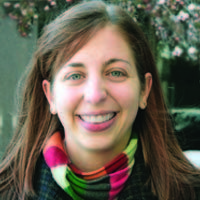
When Emily Doll discussed her research at the 33rd Annual Women in German Conference, many of the scholars in the audience were surprised to learn the polished presenter was “only” an undergraduate.
“But they all thought it was great that I came—and that it’s a great idea for students who are interested in getting their Ph.D.s to get involved in research as early as possible,” Doll says.
Her study of Elizabeth Heinroth, a feminist author who penned novels combining romance and social commentary, impressed her conference colleagues. They were especially taken when the Notre Dame senior detailed her graduate-school-style experience of grant applications, travel, original research, and faculty collaboration—a journey that began her sophomore year.
A Strong Start
That’s when Doll took a survey class with Denise Della Rossa, associate professional specialist with the Department of German and Russian Languages and Literatures. It was not too soon, Della Rossa recalls, to start talking with Doll about writing a senior thesis.
“We strive to identify excellent students early in their university career who display the intellect, motivation, and discipline to conduct sustained independent research in consultation with a faculty mentor,” Della Rossa says. But first, Doll knew, she wanted to go abroad to study German.
That trip, paid for by a summer grant from her department, came after her sophomore year. And it began what Della Rossa describes as her “extraordinary trajectory.”
During first semester of her senior year, using money from the Undergraduate Research Opportunities Program, she then presented her findings at the national conference. “It is very unusual,” Della Rossa notes, “for an undergrad to have her work accepted at such a conference.”
The Senior Thesis Culture
Doll’s experience is the result of the undergraduate research culture Notre Dame’s College of Arts and Letters is building, Della Rossa says. Faculty and students work together, and research plays a critical role in students’ learning and future plans.
“These undertakings are going a long way not only in creating a research culture during students’ undergraduate years,” Della Rossa says, “but also in encouraging our students to apply for post-baccalaureate opportunities such as the Fulbright Fellowships and the Marshall Scholarship.”


